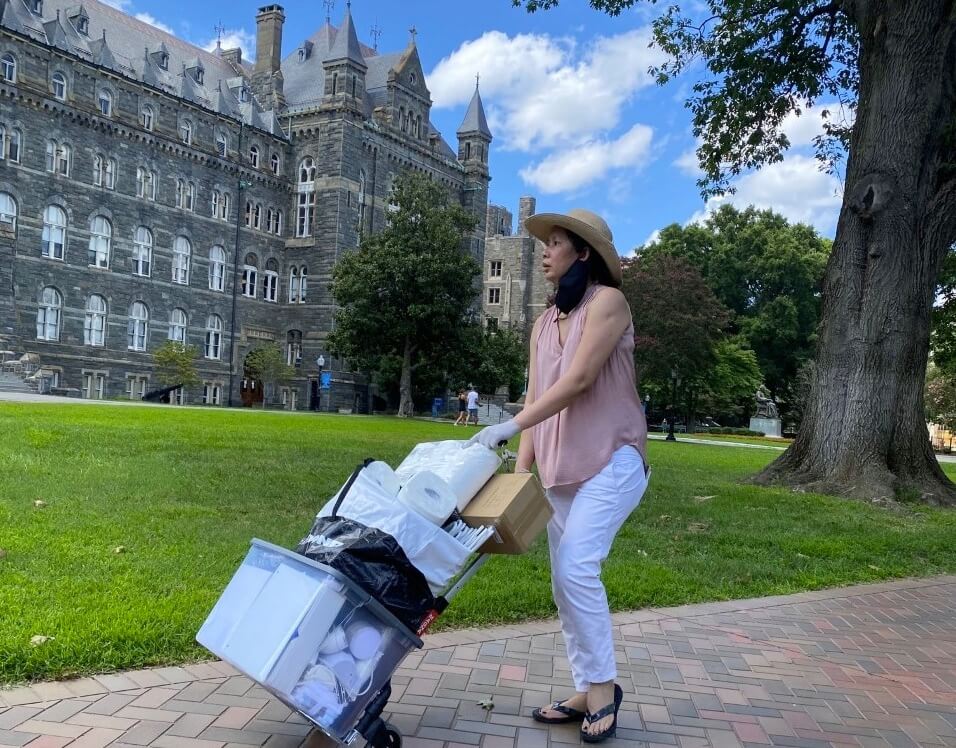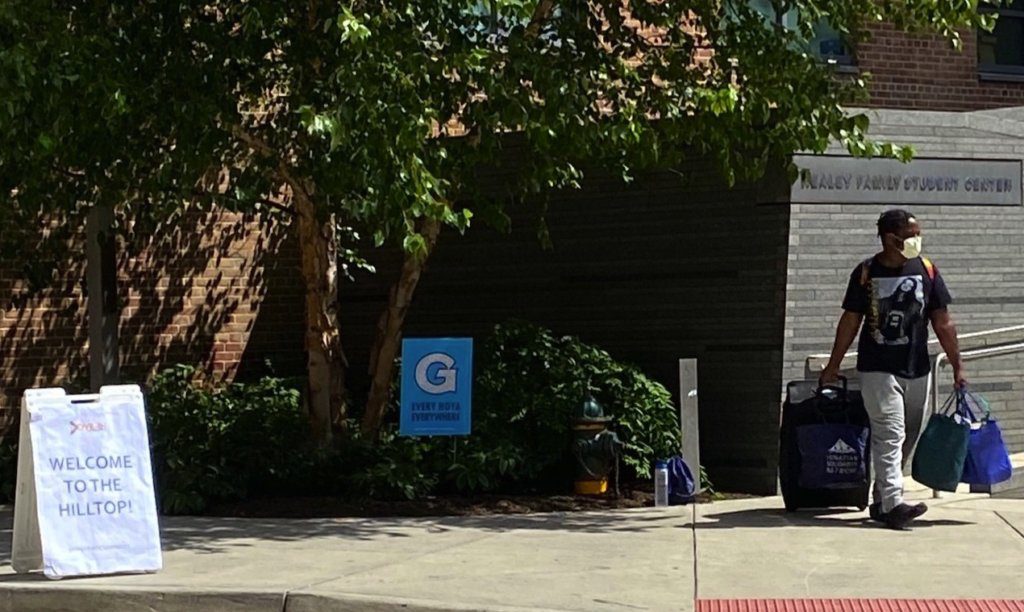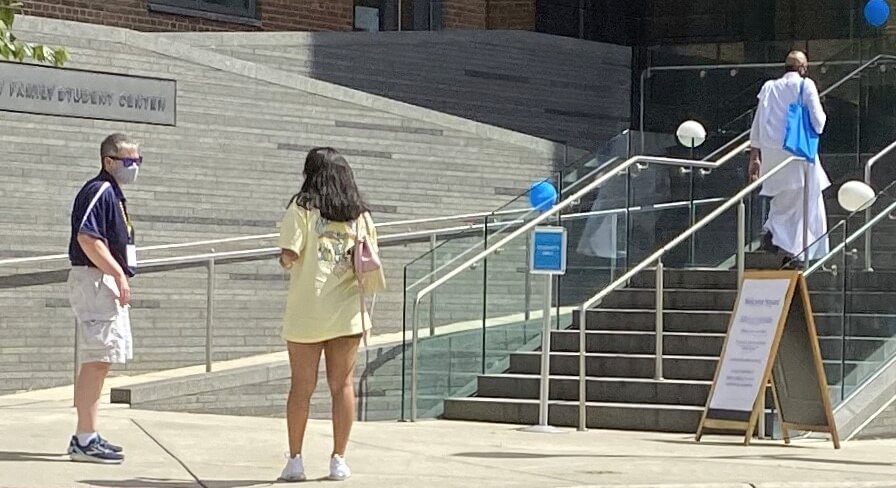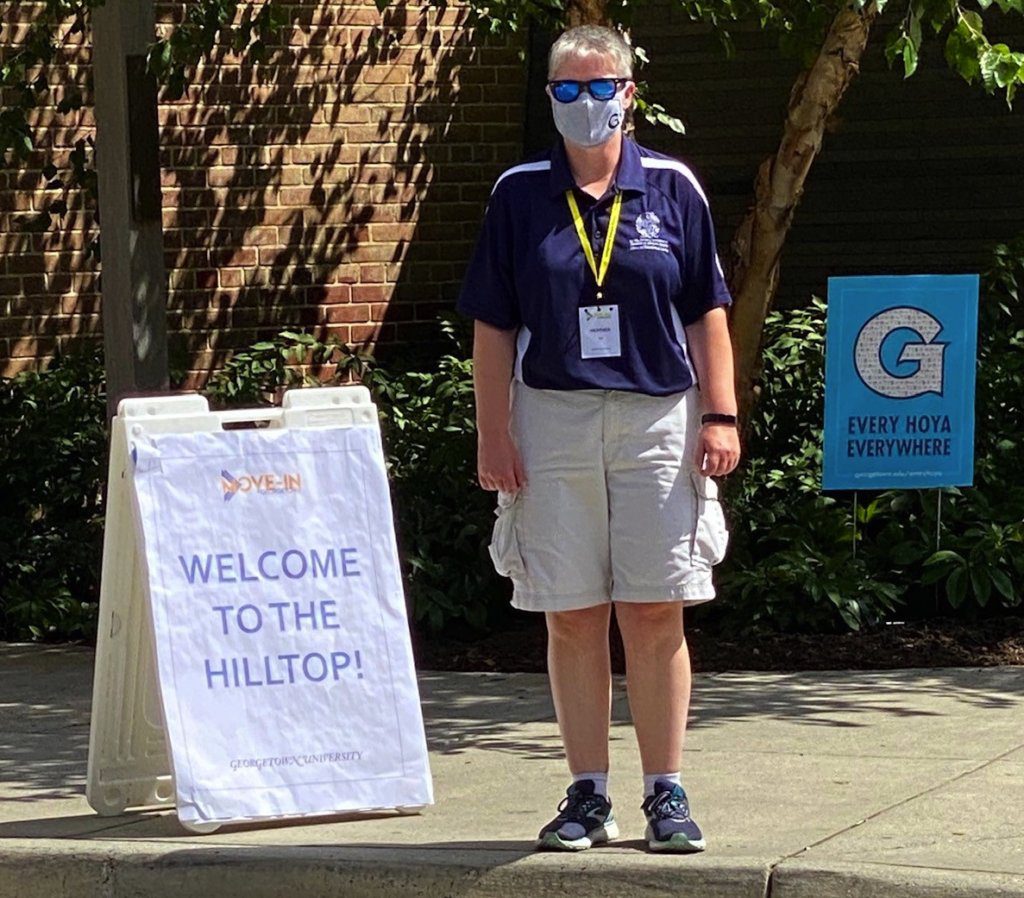500 GU Students Show Up on Move-In Weekend
By • August 24, 2020 0 1714

On Sunday, Aug. 23, the campus of Georgetown University was filled with what used to be a normal sight this time of year, but now felt unexpected, even surprising: students and parents hauling luggage, bins and bags full of clothes from neighboring side streets onto the lawns and up the stairs of Village A and Ryan-Isaac dorms and the Healey Student Center.
“Due to the acceleration of the spread of the [COVID-19] virus and increasing restrictions on interstate travel, we cannot proceed with our original plans for returning to campus this fall,” G.U. President John J. DeGioia told the university community. “Select activities—such as biomedical, life and physical sciences research—will continue to take place on-campus according to our established plans. We plan to introduce in-person course elements as soon as health conditions permit.”
The university had announced on July 29 that the campus would be totally shut down. Due to the pandemic, all classes would be conducted remotely until Thanksgiving, then not meet again until 2021.
But some 500 students had been accepted to live in the dorms and university townhouses for the shortened semester. Move-in weekend was Aug. 22 and 23.
It was not joyous. Everyone wore masks and each family group was carefully social-distanced. Once the students checked in, they were given virus test kits. They had agreed that, once they said goodbye to their families, they would take the tests, give them to university health officials, then self-quarantine. For two weeks. In their single rooms (double in the case of some townhouses). The university would bring them food and supplies. But they agreed not to leave their rooms for a fortnight.
After that, there would be frequent testing, but students on campus would be able to eat at defined times in student dining halls with social distancing. “We’re working on how and when the library will be open to students on campus. Perhaps on an appointment basis,” a student affairs staffer on the scene told The Georgetowner on Sunday.
Hundreds of students had applied to be able to stay on campus, though all the classrooms were closed and faculty members were working remotely or alone in their offices and labs. Students from five major groups were considered: upperclassmen, freshmen, transfer students, international students and resident assistants.
“Priority for on-campus residence has been given to students whose personal or family situation makes it impossible or impractical to complete their studies at their permanent address,” Provost Robert Groves wrote in an email sent to the student body on July 7, when teaching was to be part in-person and part virtual. However, parameters tightened with the total shutdown.
By early August, qualifying circumstances for on-campus housing included housing or food insecurity, safety and security concerns in a student’s current living situation, an extraordinary living situation paired with high financial need, a lack of internet accessibility or a permanent address more than five time zones away from Eastern Standard Time. In the application, students were asked to identify which of these circumstances, or other extenuating circumstances, applied to them, providing a short explanation.
Hundreds of applications were rejected and students were asked not to appeal unless their circumstances had changed, according to the Georgetown Voice, a student newspaper.
“The decisions were made by a group of administrators,” a student affairs officer who didn’t want to be identified told The Georgetowner. “No one can really be exactly sure why they were rejected or accepted.”
The Voice reported that complaints about the decisions came from all groups, notably international students who felt sidetracked though they met the “five zones away” requirement; LGBTQ students who lived with families that did not accept their identities; and disabled students with somewhat invisible disabilities (such as narcolepsy) who were now “made to feel even more invisible.”
The Georgetowner met students from New York, Texas and Nicaragua who were moving into campus dorms and townhouses.
Three female students, seniors from Connecticut who had lived together for three years on campus, said they were excited to be have found an apartment off campus.
“Normally all students have to live in university dorms, but with the campus closed, we are free to live where we want,” one said. “We have to do our studies online, but we don’t have to be home. We want to be near campus and our friends, not in our parents’ dining room or our childhood bedrooms,” one junior from California said.
For students off campus, the university promised a ten percent discount from the semester fee of $28,692. On campus students would pay full tuition fee but housing and dining fees were to be reduced by 20 percent because of the shortened semester. Many students also receive financial aid and grants which cut their personal costs.

At New South dormitory at Georgetown University Aug 23. Photo by Peggy Sands.

At New South dormitory at Georgetown University Aug 23. Photo by Peggy Sands.

Move-in assistant at Georgetown University Aug 23. Photo by Peggy Sands.

